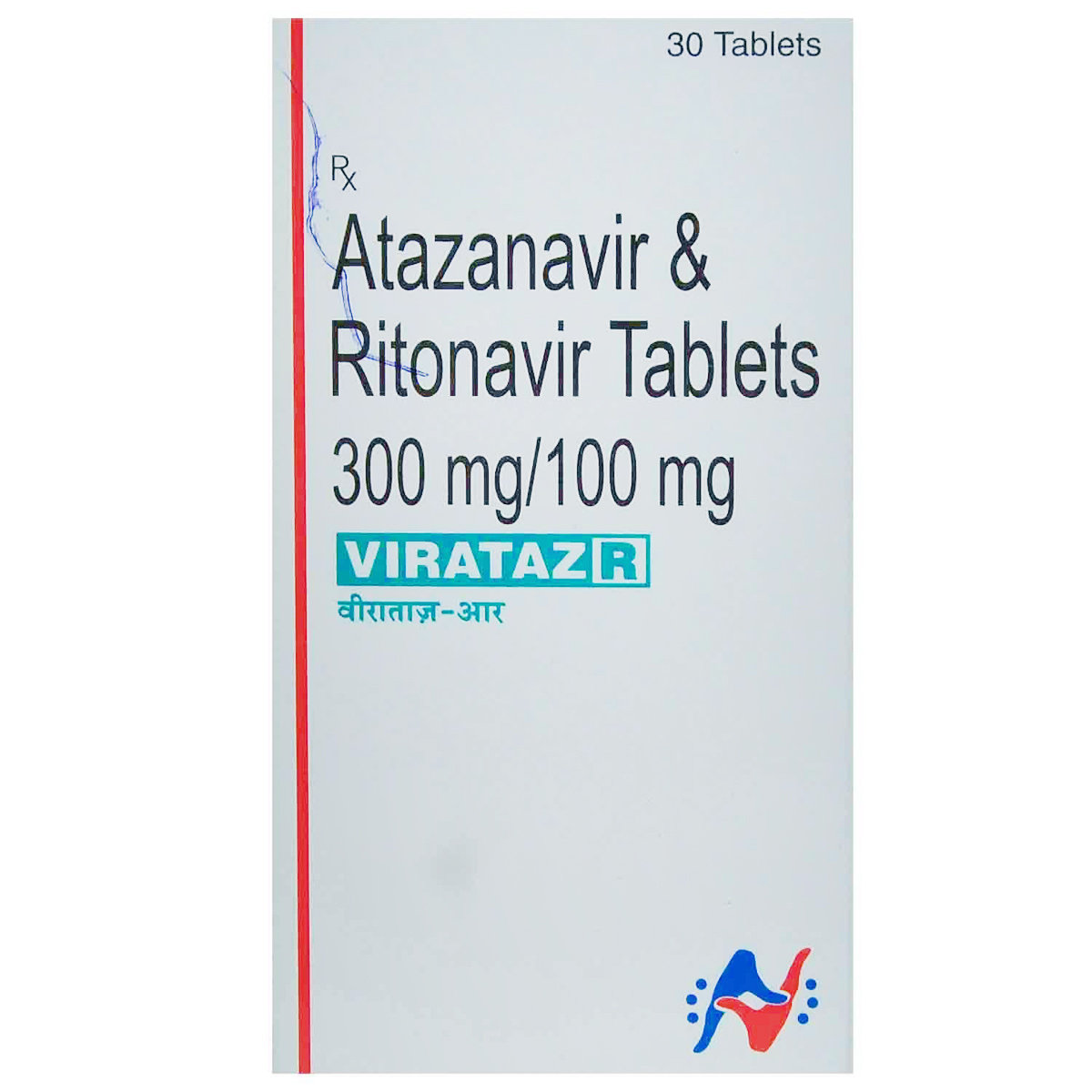Atazanavir
About Atazanavir
Atazanavir is an antiretroviral medicine used in the treatment of HIV infection. HIV is a retroviral infection that attacks and destroys immune cells. This reduces the body's ability to fight infections and illnesses. If this condition is left untreated, it can lead to Acquired Immuno Deficiency Syndrome (AIDS). Symptoms of HIV include fever, chills, night sweats, muscle aches, etc.
Atazanavir contains Atazanavir, which belongs to the class of protease inhibitors. It works by inhibiting the protease enzyme production, which is required for the HIV-infected cells to make new viruses. This causes inhibition of viral replication.
Atazanavir may cause certain side effects such as nausea, headache, stomach pain, loss of appetite, vomiting, depression, fever, tiredness, back pain, blood in urine, diarrhea, muscle pain, dizziness, and allergic reactions. Most of these side effects do not require medical attention and gradually resolve over time. However, if the side effects persist, please consult your doctor. Atazanavir should be taken as advised by your doctor. Your doctor will decide the dose of the medicine based on your health condition. Do not take more than the recommended dose.
Atazanavir should be avoided if you are allergic to it. It is contraindicated in patients with Stevens-Johnson syndrome, erythema multiforme or patients taking alfuzosin, triazolam, orally administered midazolam, ergot derivatives, rifampin, irinotecan, lovastatin, simvastatin, indinavir, cisapride, pimozide, as it can cause serious side effects. Hence avoid using this medicine under such conditions. Inform your doctor if you have any cardiovascular conditions, liver/kidney disease, diabetes, or immune reconstitution syndrome on priority. Atazanavir should be given to pregnant and breastfeeding women only if recommended by the doctor. Atazanavir is not recommended for children below six years of age as safety and efficacy are not established.
Uses of Atazanavir
Medicinal Benefits
Atazanavir contains Atazanavir, which belongs to the class of protease inhibitors. It works by inhibiting the protease enzyme production, which is required for the HIV-infected cells to make new viruses. This causes inhibition of viral replication. Atazanavir is used alone or in combination with other antiretroviral medicines to help reduce the symptoms, control the infection, and prevent opportunistic infections effectively. It also helps in improving the quality of life of a patient with HIV.
Directions for Use
Storage
Side Effects of Atazanavir
- Nausea
- Abdominal pain
- Vomiting
- Dizziness
- Back pain
- Blood in urine
- Loss of appetite
- Mouth sores
- Tiredness
- Depression
Drug Warnings
Atazanavir should be avoided if you are allergic to it. It is contraindicated in patients with Stevens-Johnson syndrome, erythema multiforme or patients taking alfuzosin, triazolam, orally administered midazolam, ergot derivatives, rifampin, irinotecan, lovastatin, simvastatin, indinavir, cisapride, pimozide, as it can cause serious side effects. Hence avoid using this medicine under such conditions. Inform your doctor if you have any cardiovascular conditions, liver/kidney disease, diabetes, or immune reconstitution syndrome on priority. Atazanavir should be given to pregnant and breastfeeding women only if recommended by the doctor. Atazanavir is not recommended for children below six years of age as safety and efficacy are not established. This medicine may cause dizziness; hence avoid driving or operating machines while taking Atazanavir.
Drug Interactions
Drug-Drug Interactions: Atazanavir may interact with alpha-adrenergic blockers (prazosin, alfuzosin), gastrointestinal medicine (cisapride), contraceptives (ethynyl estradiol, norethindrone), immunosuppressants (cyclosporin, sirolimus, tacrolimus), antibiotics (clarithromycin), etc.
Drug-Food Interactions: Avoid smoking and alcohol consumption.
Drug-Disease Interactions: Inform your doctor if you have cardiac problems, liver or kidney disease, or diabetes.
Drug-Drug Interactions Checker List:
Safety Advice

Alcohol
unsafeAlcohol intake might increase the risk of stomach or intestine bleeding. Hence, avoid alcohol consumption while receiving Atazanavir to prevent serious side effects.

Pregnancy
cautionIf you are pregnant or planning pregnancy, inform your doctor before taking Atazanavir. Your doctor may prescribe this medicine if the benefits outweigh the risks.

Breast Feeding
cautionHIV-infected mothers should not breastfeed their infants due to the risk of postnatal transmission of HIV. It is unknown whether atazanavir is found in human milk. Because of the risk of HIV transmission and major adverse reactions in nursing infants, mothers should be advised not to breastfeed if they are taking Atazanavir.

Driving
cautionAvoid driving vehicles as it may cause dizziness and affect your ability to drive. Hence, it is advised to drive only when you are alert.

Liver
cautionAtazanavir should be used with caution in patients with liver impairment. Your doctor may adjust the dose of this medicine or prescribe a suitable alternative based on your condition. However, this medicine is contraindicated in patients with severe liver disease.

Kidney
cautionAtazanavir should be used with caution in patients with kidney impairment. It should not be used in HIV treatment undertaking patients with end-stage renal disease who were managed with hemodialysis. Your doctor may adjust the dose of this medicine or prescribe a suitable alternative based on your condition.

Children
unsafeAtazanavir is not recommended for use in children below six years of age, as efficacy and safety have not been established. It should be given only upon paediatrician advice for children above six years of age.
Habit Forming
Diet & Lifestyle Advise
- Eat a healthy and balanced diet. Eat vitamin and nutrient-rich food such as vegetables and fruit as it helps to boost your immune system. Try to take lean protein and whole grains.
- Avoid eating raw meat and eggs. Consume properly boiled and cooked meat, poultry or seafood.
- Eat bland and low-fat foods, and avoid spicy or oily foods if you experience nausea or vomiting.
- Practise safe sex by using condoms; it helps in reducing contact with semen and vaginal fluids.
- Never share personal items with body fluids or blood on them, such as razor blades or toothbrushes.
- Avoid sharing used needles, other injection or drug equipment.
- Get tested for other sexually transmitted infections, such as gonorrhoea or syphilis.
- Try to reduce emotional and physical stress by spending time with your family or doing whatever makes you happy.
- Drink more fluids and avoid alcoholic beverages to prevent dehydration.
Special Advise
- Get an HIV test done at least every three months.
- Regular kidney and liver function and bone mineral density tests while taking Atazanavir are advised.
- Regularly get blood and urine tests done while taking Atazanavir.
- Atazanavir may still develop infections or other illnesses associated with HIV infection or AIDS. So, people taking Atazanavir should be carefully monitored throughout the treatment.
Patients Concern
Disease/Condition Glossary
HIV Infection: Human Immunodeficiency Virus (HIV) is a retroviral infection that attacks and damages the cells of the immune system. This weakens the ability to fight against infections and diseases. If this condition is left untreated, it can lead to Acquired Immuno Deficiency Virus (AIDS). Symptoms of HIV include headache, fever, chills, joint pain, fatigue, swollen lymph nodes, sore throat, mouth nodes, muscle aches, etc. Atazanavir helps reduce the symptoms, control the infection, and also helps improve the HIV patient’s quality of life.
FAQs
Atazanavir contains Atazanavir, which belongs to the class of protease inhibitors. It works by inhibiting the protease enzyme production, which is required for the HIV-infected cells to make new viruses. This causes inhibition of viral replication.
No, completing the entire treatment course prescribed by the doctor is always recommended. Sudden discontinuation of the medicine can lead to serious side effects. Your doctor will decide whether to stop the medication or not.
Atazanavir doesn’t cure HIV infection. However, it helps to control the disease and prevent opportunistic infections.









